Somali airstrike kills 15 al-Shabaab militants in Middle Shabelle
The Somali Army carried out a targeted airstrike in southern Somalia, killing 15 al-Shabaab militants, the country’s Defence Ministry said on Sunday...
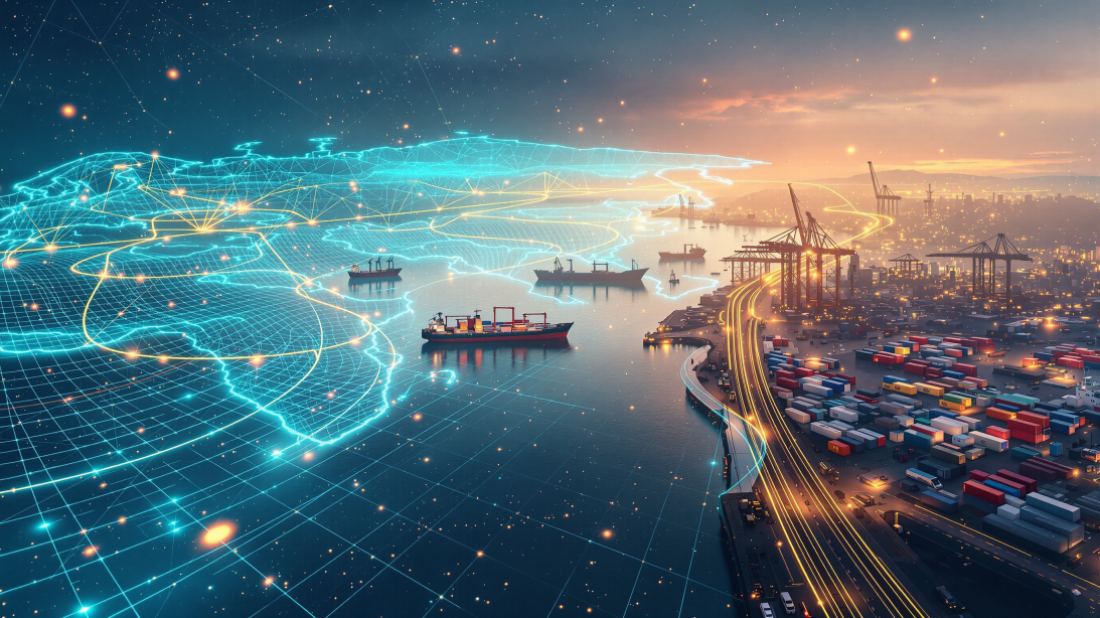
Baku, Azerbaijan's capital, has emerged as the pivotal hub connecting Central Asia to global markets, with the Middle Corridor transport route experiencing unprecedented growth in 2024.
The city's strategic position at the crossroads of Europe, Asia, and the Middle East has transformed it into a critical gateway for international trade, energy transit, and regional connectivity. Through massive infrastructure investments and diplomatic initiatives, Azerbaijan has positioned Baku as the cornerstone of trans-Eurasian commerce, facilitating trade flows that bypass traditional routes and offer new opportunities for economic integration between continents.
Strategic Geographic Advantage
Azerbaijan's unique geographical location places it at the intersection of major East-West and North-South transportation corridors, making Baku a natural transit hub for intercontinental trade. The country serves as a bridge between the vast markets of China and Europe, offering shorter and more economical routes compared to traditional maritime passages. This positioning has become increasingly valuable as global trade patterns shift due to geopolitical tensions and the search for alternative supply chains.
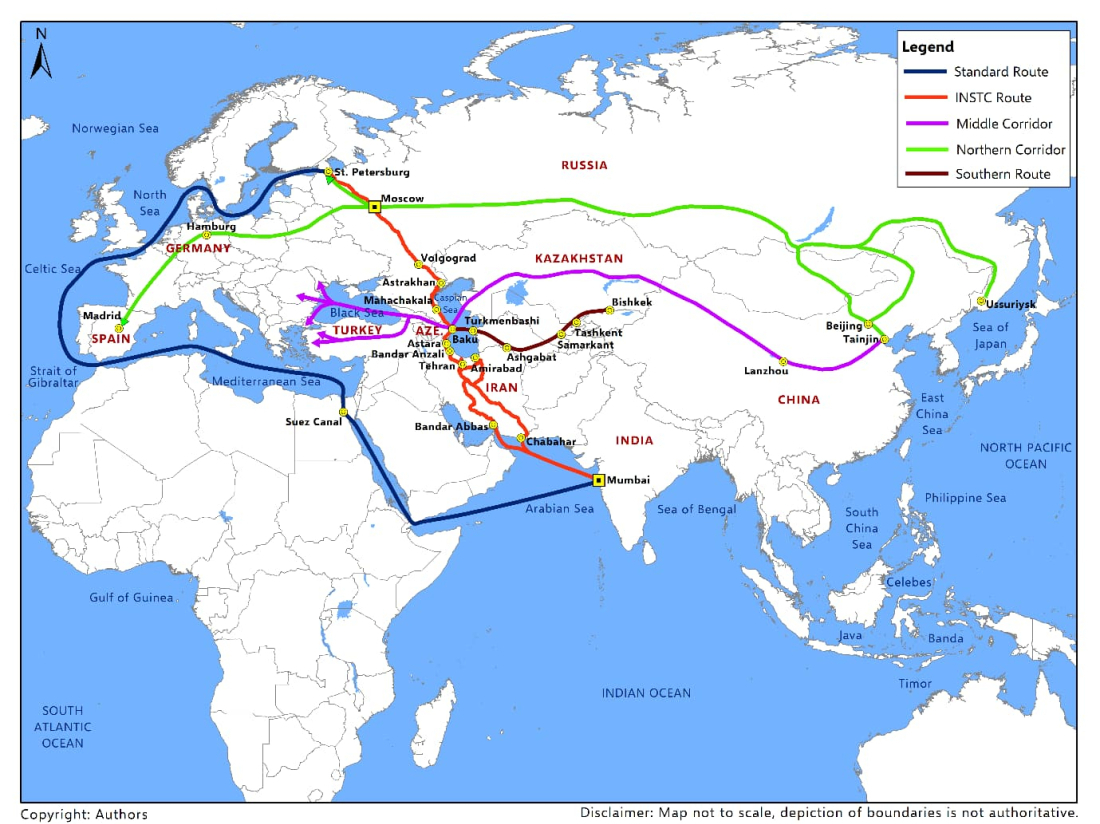
The strategic importance of Baku's location has been amplified by recent global events, including sanctions on Russia and disruptions in traditional shipping routes. European nations and China are actively seeking reliable alternatives to established corridors, positioning the Middle Corridor through Azerbaijan as a crucial component of future trade infrastructure.
The Middle Corridor: Infrastructure Backbone
The Trans-Caspian International Transport Route, commonly known as the Middle Corridor, represents the cornerstone of Central Asia's connection to global markets through Baku. This multimodal route extends from China through Kazakhstan, crosses the Caspian Sea via Azerbaijan, continues through Georgia, and reaches European markets via Türkiye. The corridor combines railway, maritime, and highway transport to create a comprehensive logistics network that significantly reduces transit times between Asia and Europe.
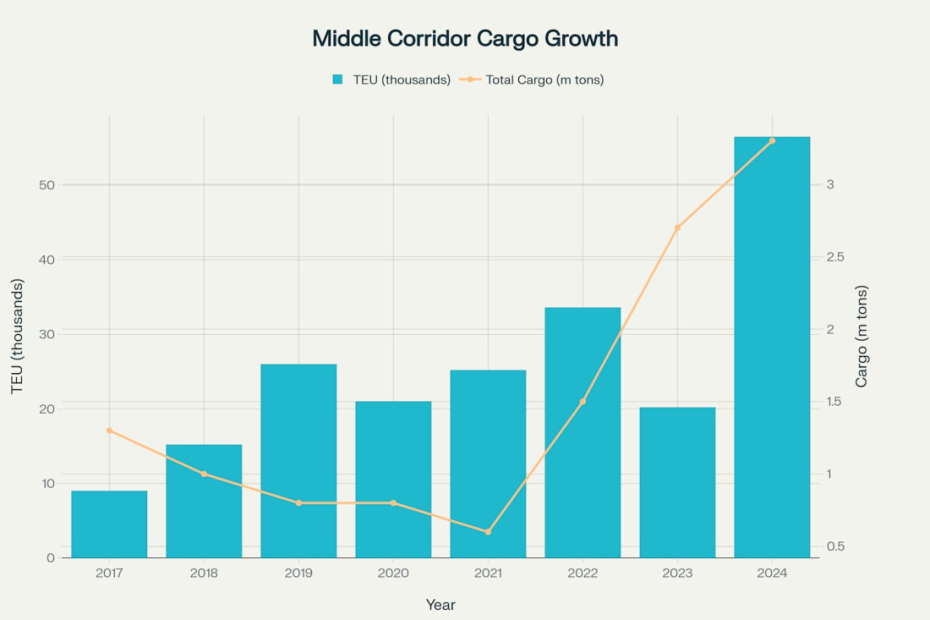
Recent performance data demonstrates the corridor's dramatic growth trajectory, with cargo volumes increasing by 70% in the first nine months of 2024, reaching 3.4 million tons. Container transportation has shown even more impressive growth, with volumes tripling in January-September 2024 compared to the same period in 2023, reaching 34,600 TEU. The volume of cargo transported from China through the Middle Corridor increased more than 25 times in 2024 compared to 2023, surpassing 27,000 containers.
Baku-Tbilisi-Kars Railway: The Land Bridge
The Baku-Tbilisi-Kars (BTK) railway serves as the primary land connection linking Azerbaijan's rail network to Türkiye and onwards to Europe. Stretching approximately 826 kilometers, this railway significantly reduces overland journey times between China and Europe to just 15 days, compared to the previous 25-45 days. The completion of modernization work in 2024 increased the BTK's annual carrying capacity from 1 million to 5 million tons, with ultimate projections reaching 17 million tons annually.
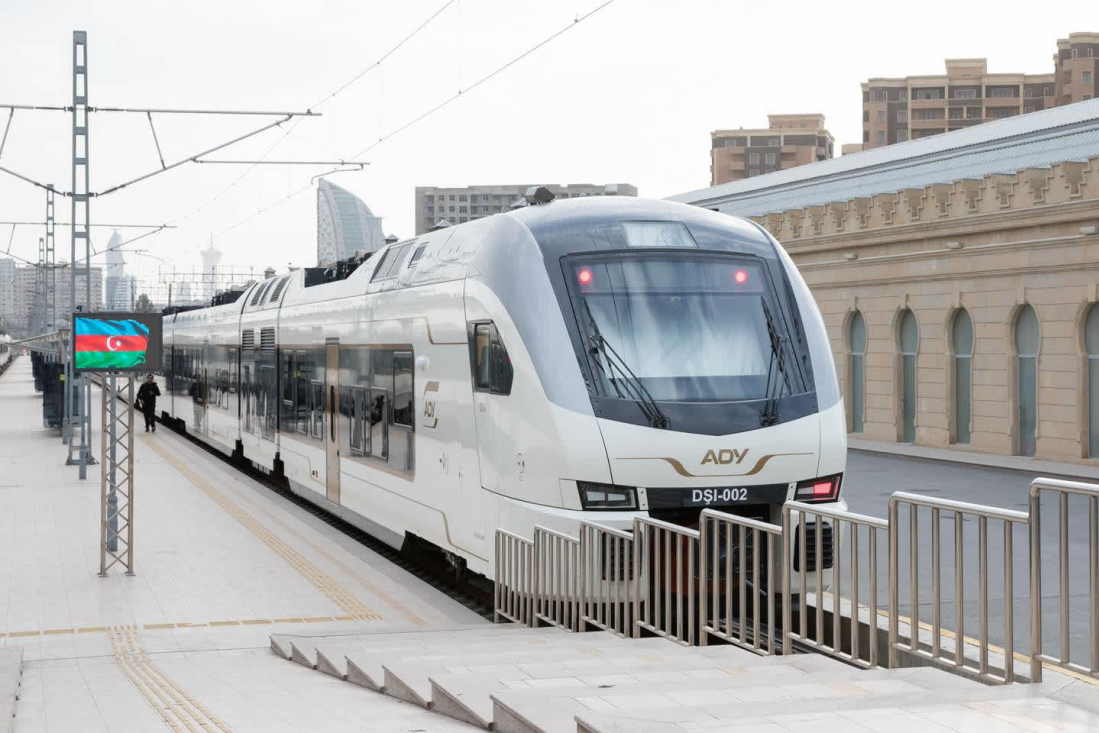
The modernization project involved extensive infrastructure upgrades, including the installation of 61 kilometers of railway tracks, 98 kilometers of contact network lines, and 338 kilometers of fiber-optic cables. These improvements have enabled the resumption of freight operations and enhanced the competitiveness of the Middle Corridor in global trade networks.
Port Infrastructure and Maritime Connectivity
The Port of Baku, specifically the Alat International Trade Seaport, serves as the crucial maritime link in the Middle Corridor network. The port's strategic development has proceeded in two phases, with the first stage completed in 2019, increasing total handling capacity to 15 million tons of general cargo and up to 100,000 TEU containers. The second phase aims to expand capacity to 25 million tons of total cargo and up to 500,000 TEU containers.
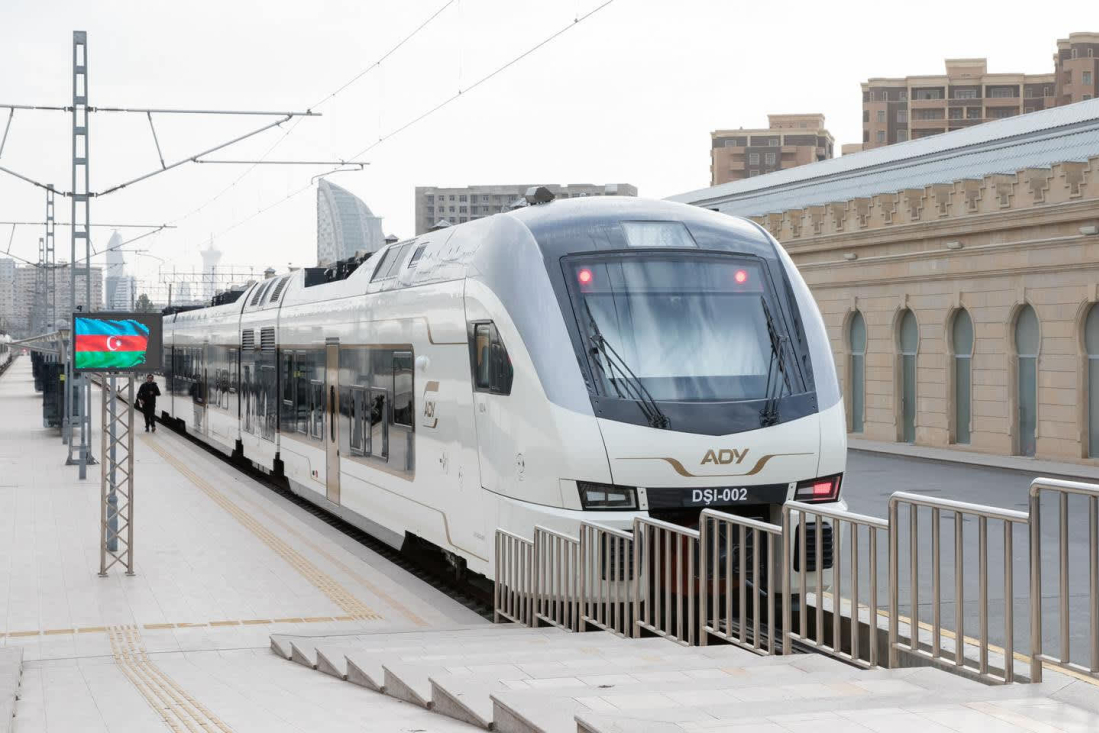
The port's infrastructure includes ferry terminals, container bridges, Ro-Ro bridges, and general cargo facilities that enable efficient multimodal transportation across the Caspian Sea. Recent announcements indicate plans to expand the annual throughput capacity from 15 million to 25 million tons, demonstrating Azerbaijan's commitment to meeting growing demand.
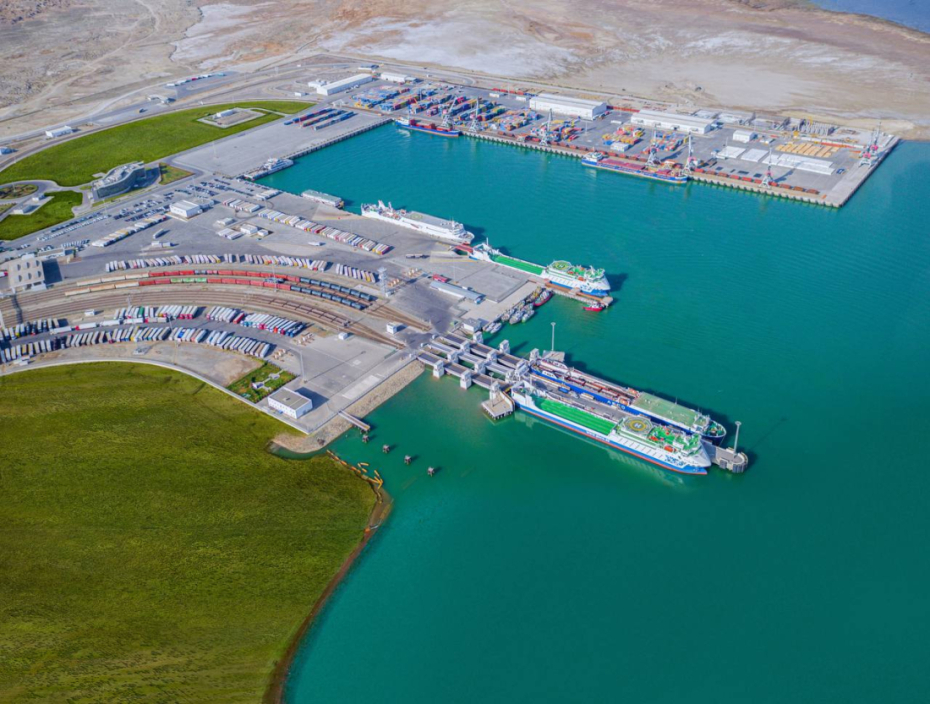
Caspian Sea shipping operations complement the port infrastructure, with specialized services utilizing various routes including the Volga-Don connection to link the Caspian Sea with the Black Sea. These maritime services provide essential connectivity for Central Asian nations that lack direct access to international waters.
Economic Impact and Trade Volumes
The growth of transit trade through Baku has generated significant economic benefits for Azerbaijan and the broader region. Azerbaijan's transport sector revenues reached 14.1 billion manat ($8.2 billion) in 2024, representing a 12.9% increase compared to the previous year. This growth reflects the increasing importance of transit services in Azerbaijan's economic diversification strategy.
Transit freight transportation by Azerbaijan Railways reached 6.8 million tons in 2023, compared to 3.8 million tons in 2019, demonstrating the sustained growth in cargo volumes. The infrastructure improvements and diplomatic initiatives have positioned Azerbaijan to handle at least 1,000 block trains annually, significantly expanding its role in international transportation networks.
Regional trade patterns show Central Asian countries increasingly utilizing the Middle Corridor for access to European markets. Kazakhstan, as the largest economy in Central Asia, sends approximately 85% of goods traveling from China to the EU through its territory, much of which continues via the Middle Corridor through Azerbaijan. The volume of goods transported along the Trans-Caspian International Transport Route rose 20% in 2024, reaching 3.3 million tonnes.
Infrastructure Development and Investment
Major international financial institutions have committed substantial resources to developing the Middle Corridor infrastructure. The European Bank for Reconstruction and Development (EBRD) announced its readiness to invest approximately €1.5 billion in Trans-Caspian Corridor-related infrastructure over the next 2-3 years. In 2024, the EBRD invested €196 million in 8 projects in Azerbaijan, with 82% allocated to the green economy.
The Asian Development Bank, World Bank, and Asian Infrastructure Investment Bank have also provided technical and financial support for various transportation and logistics projects across Azerbaijan. These investments focus on enhancing Azerbaijan's capacity to manage trans-Eurasian rail transport and strengthen its role in global trade networks.
Recent infrastructure projects include the modernization of container handling equipment at Aktau Port in Kazakhstan, double tracking and electrification of railway networks, and development of key road connections. Border crossing improvements and the elimination of unnecessary trade barriers are also priority areas for investment.
Energy Corridors and Green Transition
Beyond traditional cargo transport, Baku serves as a crucial hub for energy transit connecting Central Asian resources with European markets. Azerbaijan has been instrumental in creating energy corridors linking Central Asia, the Caspian region, and Europe, leveraging its position as a major energy producer. The country's Caspian Sea basin resources form a fundamental part of its economic base and provide the foundation for regional energy cooperation.
The establishment of the Green Corridor Alliance joint venture between Azerbaijan, Kazakhstan, and Uzbekistan represents a significant step toward developing renewable energy transit capabilities. This partnership will prepare feasibility studies for creating the Central Asia-Azerbaijan green energy corridor for exports to Europe via Azerbaijan. The initiative aligns with Azerbaijan's technical potential for renewable energy sources, estimated at 135 GW on land and 157 GW at sea.
Current renewable energy projects include cooperation with ACWA Power for the construction of wind power stations with capacity up to 1.5 GW offshore and 1 GW onshore. These developments position Azerbaijan as a future hub for green energy exports from Central Asia to European markets.
Diplomatic Initiatives and Regional Cooperation
Azerbaijan's enhanced cooperation with Central Asian countries has been strengthened through high-level diplomatic engagement and strategic partnerships. President Ilham Aliyev's meetings with leaders from Kazakhstan, Kyrgyzstan, and Uzbekistan have resulted in bilateral cooperation agreements and joint investment funds that facilitate infrastructure development.
The meeting of Heads of State of Central Asia and the Republic of Azerbaijan in Astana, Kazakhstan, emphasized the importance of transport and transit cooperation as a pivot of bilateral relations. These diplomatic initiatives have translated into practical cooperation on infrastructure projects and trade facilitation measures.
Regional organizations and multilateral frameworks support the continued development of connectivity projects. The Organization of Turkic States provides a platform for deeper cooperation among Turkic nations in Central Asia and Azerbaijan. Additionally, Azerbaijan's alignment with the Belt and Road Initiative has accelerated bilateral cooperation and regional integration processes with China.
Future Prospects and Challenges
The Middle Corridor's development trajectory suggests continued growth in cargo volumes and infrastructure capacity. World Bank projections estimate that by 2030, travel times between the western border of China and Europe will halve, and freight volumes will triple to 11 million tons. The 2023 EBRD report projects that the Middle Corridor could achieve a transit capacity of 130,000 TEUs by 2040 in a business-as-usual scenario, potentially expanding to 1.4 million TEUs if existing bottlenecks are removed.
Several challenges remain in realizing the corridor's full potential. Limited transport capacity, particularly shortages in locomotives and wagons, creates congestion in rail networks. Maritime transport across the Caspian Sea faces bottlenecks due to limited vessel availability and outdated port infrastructure. The corridor also requires modern logistics hubs for efficient transit, cargo consolidation, and storage of goods.
Ongoing projects address these challenges through railway electrification, expansion of intermodal logistics hubs, and enhanced port automation. The Trans-Caspian Transport Corridor Coordination Platform, established in 2024, aims to improve cross-border collaboration and streamline customs processes. Plans to digitize customs clearance and implement smart tracking systems will enhance transparency and reduce transit times.
Conclusion
Baku's emergence as the strategic gateway connecting Central Asia to global markets represents a fundamental shift in Eurasian trade patterns. The dramatic growth in cargo volumes, infrastructure investments, and diplomatic cooperation demonstrates the successful transformation of Azerbaijan into a crucial transit hub. The Middle Corridor's continued development promises to enhance global supply chain security while providing Central Asian nations with reliable access to international markets.
The combination of traditional cargo transport capabilities and emerging green energy corridors positions Baku at the center of future economic integration between Asia and Europe. As geopolitical tensions continue to reshape global trade networks, Azerbaijan's strategic investments in infrastructure and regional cooperation ensure its continued relevance as the primary link connecting Central Asia to the world.
U.S. Ambassador to NATO Matthew Whitaker said China has the power to bring an end to Russia’s war in Ukraine, arguing that Beijing is enabling Moscow’s military campaign.
American figure skating star Ilia Malinin endured a dramatic collapse in the men’s free skate on Friday night, falling twice and tumbling out of medal contention at the Milan Cortina Winter Olympics as Kazakhstan’s Mikhail Shaidorov surged to a surprise gold medal.
“Respected and feared globally,” U.S. President Donald Trump told troops at Fort Bragg on Friday (13 February), framing America’s renewed strength against to mounting pressure on Iran amid stalled nuclear talks.
Speaking at Munich Security Conference, Ukrainian foreign minister Andrii Sybiha calls for decisive steps ahead of expected Geneva talks
Thousands of fans packed River Plate’s Monumental Stadium in Buenos Aires on Friday for the first of three sold-out concerts by Puerto Rican reggaeton star Bad Bunny, as part of his “Debí Tirar Más Fotos” World Tour.
Israel’s cabinet on Sunday approved measures aimed at expanding state oversight of land in the occupied West Bank and facilitating land purchases by settlers, a move Palestinian officials described as a 'de-facto annexation.'
U.S. President Donald Trump said on Sunday that member states of the newly formed Board of Peace will announce pledges exceeding $5 billion for Gaza’s reconstruction during a gathering in Washington this week.
Iran is pursuing a nuclear agreement with the U.S. that delivers economic benefits for both sides, an Iranian diplomat was reported as saying on Sunday (15 February), days before a second round of talks between Tehran and Washington.
Azerbaijani President Ilham Aliyev and Serbian President Aleksandar Vučić reaffirmed their countries’ strategic partnership in Belgrade on Sunday (15 February), signing a series of cooperation agreements.
Italy will participate as an observer in the White House initiative of 'Board of Peace,' Prime Minister Giorgia Meloni confirmed on Sunday (15 February).
You can download the AnewZ application from Play Store and the App Store.

What is your opinion on this topic?
Leave the first comment